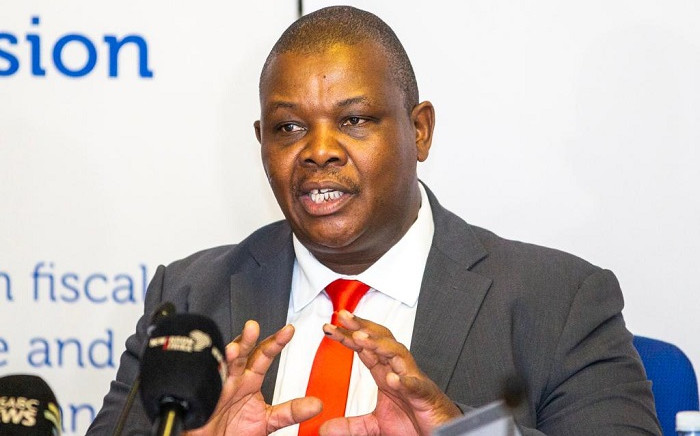WHILE we wait anxiously for the total scrapping of controversial e-tolls, the MEC for Finance Jacob Mamabolo, has promised it ‘will be a thing of the past’.
Mamabolo was presenting his last tabling of the annual budget for Gauteng’s sixth administration, revealing National Treasury had allocated Gauteng R165.8-billion for the 2024/25 financial year, on Tuesday.
The MEC said Gauteng government had approached financial institutions to raise money to settle 30% of the e-toll debt.
“Come 31 March, the gantry lights and cameras will remain on as they will continue to be operated for other law enforcement purposes but will no longer be used for e-toll collection,” he promised.
Mamabolo also acknowledged that the province faced severe financial constraints.
“This budget strikes a balance between the fiscal constraints that continue to be a drag on resource allocation and the protection of the social wage while at the same time striving towards the Gauteng of our dreams,” he said.
Despite this, the social cluster (education/health and social development) took the lion’s share of the budget, accounting for 83% of the allocation.
“Enhancing education, health and wellness and provision of social services to improve the overall quality of life for residents of Gauteng are at the heart of our functions as a provincial government and account for 83% of the 2024 MTEF [Medium-Term Expenditure Framework] budget that I table today,” Mamabolo said.
Mamabolo earmarked R65.8-billion in 2024/25 and R205.6-billion over the next three years for the Department of Basic Education to expand access to quality education and skills development opportunities, empower learners, enhance workforce readiness and drive socioeconomic development.
The allocation included nearly R24.7-billion for initiatives including school nutrition, scholar transport and the expansion of universal access to Grade R. The money will also pay for psychosocial support for inclusive education, learning and teaching support material, schools of specialisation and public and independent school subsidies.
The MEC allocated R64.8-billion in 2024/25 and R202.7-billion over the METF to the Gauteng Department of Health, to implement health and wellness interventions, particularly in townships, informal settlements and hostels.
Gauteng’s clinics and public hospitals have been under strain for years, buckling under a lack of resources, infrastructure inefficiencies and maladministration.
A total of R14.2-billion has been earmarked to broaden access to quality healthcare and re-engineer primary healthcare. The money will also be used to keep community health centres open 24 hours a day and to reduce radiation backlogs for oncology patients.
Mamabolo said the province was engaging with the Department of Health on the unemployment crisis faced by qualified doctors.
Panyaza Lesufi, GP Premier, assured the Doctors that they will get jobs following the budget allocation, insisting they will also “engage with other provinces to bring those Doctors here in Gautteng, because we need them”.
While the finance MEC said addressing homelessness and supporting vulnerable populations was a humanitarian imperative, the Gauteng Department of Social Development received the smallest allocation in the social cluster, with R5.4-billion set aside for the 2024/25 financial year and R16.9-billion to be made available over the MTEF. This is a 3% cut from the previous year.
Mamabolo said the money would be used to address societal problems, including providing funding for shelter programmes, social services and housing support initiatives to assist vulnerable populations and combat homelessness.
R190.6-million had been set aside to address drug and substance abuse and would go towards treatment centres in Randfontein, Witpoortjie and Sedibeng, as well as the drug and substance abuse programme, Mamabolo said.
Reiterating Gauteng Premier Panyaza Lesufi’s commitment to improving the living conditions of residents of townships and informal settlements, Mamabolo revealed that the Gauteng Department of Human Settlements had been allocated R5.8-billion in 2024/25 and R16.9-billion over the MTEF to provide housing enhancements and infrastructure advancements.
Gauteng Premier Panyaza Lesufi has committed to improving the living conditions of township and informal settlement residents.
Mamabolo said the allocation demonstrated “a resolve to improve living conditions in townships informal settlements and hostels”.
In 2022, Statistics SA reported that about 11% of South Africa’s population suffered from hunger and food insecurity. The Gauteng government has made provisions to address food insecurity, with Mamabolo allocating R1-billion in 2024/25 and R3.3-billion over the MTEF to the Gauteng Department of Agriculture, Rural Development and Environment to fund agri-parks and milling plants, agro-processing and the mainstreaming of urban agriculture.
The finance MEC said the allocation was in addition to the R460.3-million the department collectively receives for the Comprehensive Agricultural Support Programme, Ilima/Letsema and Land Care Conditional Grants.
Mamabolo said: “The Gauteng government remains focused on implementing programmes that provide access to nutritious food, support local agriculture, and address food insecurity among vulnerable populations, as a way of alleviating hunger, improving nutrition and enhancing food sustainability in the province.”
With an unemployment rate that increased to 33.8% in the fourth quarter of 2023, the unemployment crisis is one of the most pressing issues facing the province.
To help address the issue, the Gauteng Department of Economic Development has been allocated R1.7-billion in 2024/25 and R5.3-billion over the MTEF to create jobs and assist with other economy-boosting initiatives.
As expected opposition parties did not agree with the budget alluding “it’s an electioneering campaign”.
E-tolls are a real mess, if truth be told.
Image (MEC for Finance in GP, Jacob Mamabolo has also promised e-tolls will be scrapped finally, during his 2024/25 Budget Speech).

